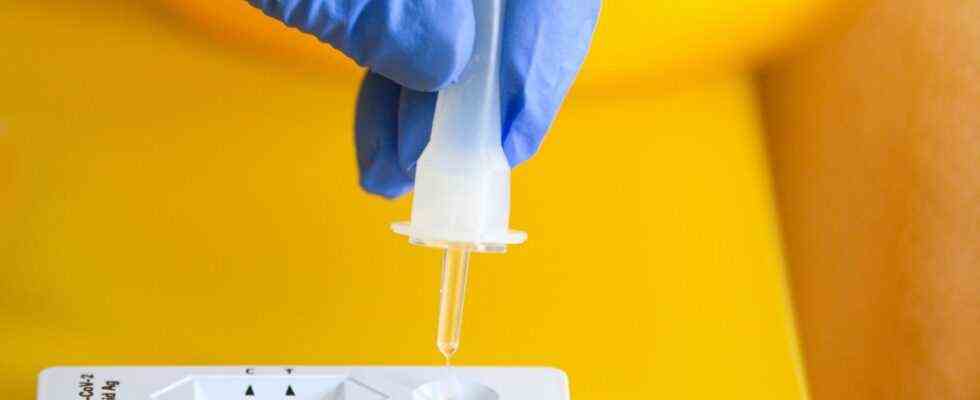A flat rate is now standard in most cell phone contracts. Allnet-Flat, SMS-Flat and Internet-Flat offer unlimited service at a flat rate. The concept is now being transferred to corona tests. After the free citizen test ends on October 11th, you can have a smear taken almost daily in Ottobrunn for a flat rate. Because the target group is primarily anti-vaccination, the business model is controversial.
In the district of Munich, the “Teste dich” rapid test center in Ottobrunn is the flat rate pioneer. For 30 euros, anyone can be tested there up to six times a week. The “Family & Friends” offer is available for groups with a maximum of five people. You get a group discount like in the outdoor pool or with Deutsche Bahn and pay a flat rate of only 40 euros.
Test center operator Oliver Mohrmann has carefully considered what sounds bizarre. “We want to keep the incentive to test up,” he says. According to him, it is about the health of the citizens of Ottobrunn. “I would like everyone to get vaccinated quickly,” says Mohrmann, but many are so decided against vaccination that a cheap test offer might prevent them from gaining access to events and restaurants without valid proof. Many test providers argue that 1G is still better than 0G. In addition, says Oliver Mohrmann, doctors’ practices and hospitals are increasingly demanding a negative test result in addition to the vaccination, but they no longer offer smears themselves.
Transferring the flat rate concept to industries beyond telecommunications is not a new idea. Until 2007, unlimited alcohol could be drunk at flat-rate parties for a few euros. Then the federal and state governments put an end to excessive consumption by means of a ban. Nevertheless, the night-loving saver can still fill up at a fixed price: Cocktail or wine flat rates can be found on many menus.
So now there is the corona test flat rate. In Ottobrunn, the offer has been well received: 30 to 40 percent of the chargeable tests are carried out at a special price, according to Mohrmann.
Such offers are still the exception. Andreas Adamosky, for example, runs three test centers in Oberhaching, Kirchheim and Aying with his medical technology distributor MTECA and bills each test individually. “It certainly does not promote the vaccination quota,” he says of the flat rate offers. Adamosky would also like everyone to have been vaccinated. For some situations and groups of people, however, a cheaper price in terms of quantity can make sense, he admits. For MTECA, a flat rate offer is also not an option because it would probably not be economically viable. The operators of the test center at the Technical University in Garching also doubt that the flat rate is worthwhile. In addition, the registration software is not designed for special offers.
So far, only the free market has set limits to the creativity of savvy test providers. Almost all test centers now offer tailor-made contracts for major customers. But special offers such as the Ottobrunner flat rates and family discounts are a new phenomenon. There is even a happy hour at a test site in Olching.
When package price pioneer Oliver Mohrmann, who is full-time managing director of a company for lighting and media technology, opened his test center in January of this year, it was not yet possible to foresee the extent of corona tests over the summer. “At that time we were only the third test site in the district,” he says. Mohrmann did not expect that testing would take so long. “I wouldn’t mind if I could concentrate on my company again soon,” he says. But as long as the tests help to detect more diseases, he wants to continue testing. And the proportion of positive tests has recently risen sharply.
The question of whether flat-rate prices benefit or harm the fight against pandemics will still have to be asked by the operators. Incidentally, the test center in Ottobrunn offers the bargain tests in a converted shop of the telephone provider O2. At least geographically, the flat rate concept is still used where it originally came from.

